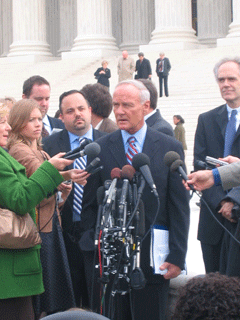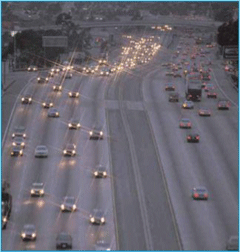High Court Considers Climate Change
Air Date: Week of December 1, 2006

Massachusetts Attorney General Tom Reilly (center) and Assistant Attorney General Jim Milkey (right) greet the press in front of the U.S. Supreme Court. (Photo: Massachusetts Attorney General's Office)
Living on Earth's Jeff Young reports on what some call the most important environmental case the Supreme Court has ever heard. The Justices will decide if greenhouse gases from autos and trucks must be considered pollutants, and whether the Environmental Protection Agency has to regulate them.
Transcript
GELLERMAN: It’s Living on Earth. I’m Bruce Gellerman. Climate change was on the docket when the U.S. Supreme Court judges heard arguments on whether the Environmental Protection Agency has to treat greenhouse gases as pollutants contributing to global warming. A dozen states say yes; the Bush administration insists no. Living on Earth’s Jeff Young was in the court during oral arguments and has our story.
YOUNG: The Supreme Court is not where David Bookbinder wanted to take the fight against global warming. The Sierra Club attorney would rather have action from Congress, or the President, not the courts.
BOOKBINDER: Trying to address climate change by suing federal regulatory agencies is the least efficient way of dealing with climate change. Unfortunately it’s the only path we have right now.
YOUNG: Lawmakers are deadlocked on climate change, and the Bush administration’s EPA says it lacks any authority to regulate greenhouse gases. So environmentalists and attorneys general for 12 states joined a lawsuit to force the agency to act. The suit says EPA must treat carbon dioxide from autos as pollutants under the Clean Air Act, which would likely lead to regulating the gas.
[COURT PLAZA SOUNDS]
YOUNG: And on an unusually warm late November day, global warming had its day in the country’s highest court.
REILLY: It’s unfortunate that the commonwealth of Massachusetts had to be here today to force the EPA and the administration to do their jobs.

Massachusetts Attorney General Tom Reilly (center) and Assistant Attorney General Jim Milkey (right) greet the press in front of the U.S. Supreme Court.(Photo: Massachusetts Attorney General's Office)
Appropriately enough, it was what court observers call a "hot bench"— all but one of the Justices had sharp questions for Milkey and administration attorney Greg Garre. Garre repeated EPA’s claim that the science of climate change was too uncertain to justify regulation. Justice John Paul Stevens said many scientists disagreed, and thought EPA had misrepresented what is a scientific consensus. Then Justice Antonin Scalia, the court’s leading conservative, agreed with a key point in Milkey’s argument for Massachusetts and the environmentalists--that Carbon dioxide fits the definition of a pollutant. Georgetown law professor Lisa Heinzerling wrote the brief for Massachusetts.
HEINZERLING: Justice Scalia, who began with a phrase that made my heart sing, which was ‘to be sure CO2 is a pollutant.’ At that point I thought maybe we should sit down. (laughter)
YOUNG: But before they could sit, the states and environmentalists had to deal with something called standing. Standing is the legal principle that you can only sue in federal court if you can show that, (a), you’ve been harmed, and, (b), the court’s action would help. Justices Scalia, Samuel Alito and Chief Justice John Roberts were all skeptical.
Scalia wondered if the threat of global warming was imminent. "When is the predicted cataclysm," he asked. Massachusetts’s attorney Milkey said the harmful effects of CO2 in the atmosphere were imminent in the way that "lighting a fuse on a bomb is imminent."

The Supreme Court will decide upon whether or not carbon dioxide emitted from automobiles should be classified as a pollutant.(Courtesy of the Department of Transportation)
MILKEY: Massachusetts owns 200 miles of coastline that is being inundated by rising seas. That harm is occurring today and it’s gonna happen tomorrow and get worse as greenhouse gases continue to accumulate in the atmosphere.
YOUNG: But Justices Roberts and Alito pointed out that the case deals with US auto emissions, and that’s only about 6 percent of the global CO2 picture.
The justices wondered if reducing only the CO2 from new US autos would make any difference. That’s a question attorney Scott Segal happily repeated on the court’s plaza.
[COURT PLAZA SOUNDS]
SEGAL: If the commonwealth of Massachusetts wins, will it be hotter or cooler in 5 years? I bring that up because it goes straight to the issue of standing.
YOUNG: Segal is with the powerful K Street law firm Bracewell and Giuliani, which represents many coal-burning power companies. Even though this case deals only with autos, it could open the door to regulation of CO2 from power plants. Segal says the Massachusetts case tries to force the square peg of global warming into the round hole of the clean air act—and the complexity of climate change means it won’t fit.
SEGAL: They have portrayed an incredibly simplistic view of climate science. The notion that you can trace it to a single auto tailpipe and say that saves a single square centimeter of coastline on Cape Cod.
YOUNG: Judging from the Justices’ line of questions the standing issue is the biggest hurdle to the Massachusetts case. And some environmental law experts fret that a ruling on that issue could have broad implications and keep other climate suits from even reaching the courts. However, if the Justices decide on the core question of the case--EPA’s authority to regulate CO2--that could break the logjam on climate change.
Some observers say a ruling for Massachusetts could strengthen efforts by states like California to cap greenhouse gases and perhaps even spur action by the newly elected Congress.
At the least, it could force EPA to revisit its decision. But one former EPA official is confident the agency’s decision not to act on greenhouse gases will stand. Until last year, Jeff Holmstead was EPA’s chief of Air issues.
HOLMSTEAD: It was the decision that I recommended and I think it’s the right decision and I think the Supreme Court will say that as well.
YOUNG: And what do you do now?
HOLMSTEAD: I just started work, I’m a partner with the firm Bracewell and Giuliani.
YOUNG: Yes, that’s the same firm that represents power companies. But Holmstead says there’s nothing wrong with his move from government regulator to representing the regulated.
HOLMSTEAD: I, I’m not sure why, uh, people have tried to make something of that. But people have to have jobs. And that’s the way it works.
YOUNG: The court is expected to rule by the summer. For living on Earth, I’m Jeff Young, at the Supreme Court.
Links
Transcripts of oral arguments in the Supreme Court case Mass. v. EPA
Stories from Living on Earth’s archives on the U.S. Supreme Court’s case on climate change:
Living on Earth wants to hear from you!
Living on Earth
62 Calef Highway, Suite 212
Lee, NH 03861
Telephone: 617-287-4121
E-mail: comments@loe.org
Newsletter [Click here]
Donate to Living on Earth!
Living on Earth is an independent media program and relies entirely on contributions from listeners and institutions supporting public service. Please donate now to preserve an independent environmental voice.
NewsletterLiving on Earth offers a weekly delivery of the show's rundown to your mailbox. Sign up for our newsletter today!
 Sailors For The Sea: Be the change you want to sea.
Sailors For The Sea: Be the change you want to sea.
 The Grantham Foundation for the Protection of the Environment: Committed to protecting and improving the health of the global environment.
The Grantham Foundation for the Protection of the Environment: Committed to protecting and improving the health of the global environment.
 Contribute to Living on Earth and receive, as our gift to you, an archival print of one of Mark Seth Lender's extraordinary wildlife photographs. Follow the link to see Mark's current collection of photographs.
Contribute to Living on Earth and receive, as our gift to you, an archival print of one of Mark Seth Lender's extraordinary wildlife photographs. Follow the link to see Mark's current collection of photographs.
 Buy a signed copy of Mark Seth Lender's book Smeagull the Seagull & support Living on Earth
Buy a signed copy of Mark Seth Lender's book Smeagull the Seagull & support Living on Earth

